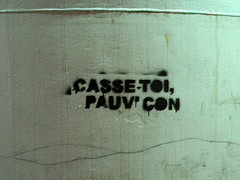France Soon to Say "Get Lost" to its Criminal Offense to the President Law
Current Berkman People and Projects 2013-04-03
Summary:
 The Legal Committee of France's Chamber of Representatives voted unanimously on March 27 to propose to repeal the offense of insulting the President of the Republic, which is still a crime under article 26 of the French Press law. French Representatives will now vote on April 18 to adopt the proposal to repeal article 26, then will send the proposal to the Senate.
The Legal Committee of France's Chamber of Representatives voted unanimously on March 27 to propose to repeal the offense of insulting the President of the Republic, which is still a crime under article 26 of the French Press law. French Representatives will now vote on April 18 to adopt the proposal to repeal article 26, then will send the proposal to the Senate.
I wrote earlier about that odd remnant in French law of the Ancien Régime belief that the Head of State must not be insulted, and talked about the judicial saga of Hervé Eon, a French citizen, arrested and fined in August 2008 for having held a placard which read "casse toi pauvre con" ("get lost you a$$...") on the side of a road where Nicolas Sarkozy, then President of France, was scheduled to pass by.
Eon was found guilty of having offended the French President, and was sentenced 30 Euros, while the maximum sentence can be as high as 45,000 Euros. He filed a complaint with the European Court of Human Rights in Strasbourg, and he won. On March 14, 2013, the European Court of Justice held in Eon v. France that France had violated article 10 of the European Convention of Human Rights protecting the right to freedom of expression. (The opinion has only published in French, and the translations in this post are mine, not an official translation.) Protection of freedom of speech by Article 10 of the European Convention of Human Rights Article 10 of the European Convention of Human Rights, to which France is a party, allows a public authority to interfere with freedom of expression, but only if such interference is (1) prescribed by law, (2) pursues one of the legitimate goals enumerated by article 10(2), and (3) is necessary in a democratic society. These three points are all taken into account by the European Court of Justice when deciding if a particular State law violates article 10.
In this case, The European Court of Human Rights found that sentencing Mr. Eon was an interference with his freedom of speech. Therefore, it undertook to determine if such interference was prescribed by law, if it pursued a legitimate goal, and if it was necessary in a democracy.
Prescribed by law: article 26 of the 1881 French Press Law
Article 26 of the French Press Law incriminates insulting the head of State, "offense au chef de l'État." The term "offense" is only used for insults to the head of State, while "injures" is used for insults to everybody else. While the French law defines at length what "injures" means, it does not define "offense."
However, the Court of Appeals which confirmed Mr. Eon's sentence specified that "[t]he courts have recognized that the offense is constituted by any offensive or contemptuous expression, by any defamatory imputation that, while about the exercise of the chief magistracy of the State and his private life, is likely to attempt to his honor or dignity."
One must have the intent to offend, but truth is not admitted as a defense. The European Court of Human Rights was not bothered by this lack of an exception for truth, as "get lost you a$$..."is meant to be insulting and is not an allegation which could be proven true or false. The court of first instance had found intent, reasoning that "[i]f the accused would not have had the intention to offend, but only intended to give an incongruous lesson in politeness, he would not have failed to precede the phrase "get lost you a$$..." by a formula such as "we do not say."
Legitimate goal: Which goal is pursued by article 26?
The court of first instance had stressed in its opinion that "the law intends to protect the function of President of the Republic," and the French government argued in front of the Strasbourg court that a law criminalizing offending the President was necessary to protect order in society.
Indeed, Article 26 of the French Press Law is part of a "délits contre la chose publique" paragraph, literally, "offenses against the Res Publica," the Republic or the public affairs. Even though article 26 also protects the President in his private life, he is protected as the first Representative of the Republic. As such, only public prosecutors can initiate the pursuit; the victim himself does not have that power.
This legal oddity was not discussed in this case, but the independence of prosecutors vis-à-vis the President was called into question in 2010 by the European Court of Human Rights in the Moulin v. France case, where the court found that French prosecutors are not independent judicial authorities. The Court reason
Link:
http://feedproxy.google.com/~r/CitizenMediaLawProject/~3/jAROFC3P-_o/france-soon-say-get-lost-its-criminal-offense-president-lawUpdated:
04/03/2013, 12:39From feeds:
Fair Use Tracker » Current Berkman People and ProjectsBerkman Center Community - Test » Citizen Media Law Project